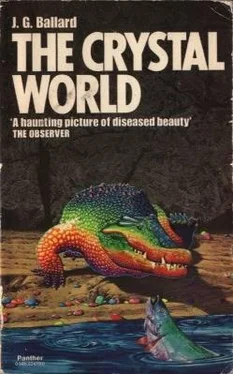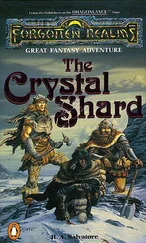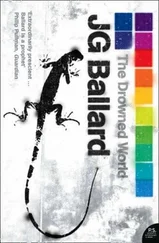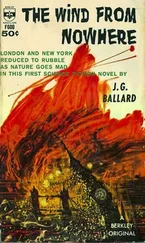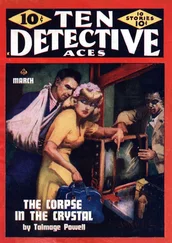Ventress kept his shotgun leveled at the cabin. Ten feet away on his right, Sanders held the automatic pistol in one hand, his other arm on the ground beside him, glowing in its own crystal life. Together they waited for Thorensen to make a move. For half an hour the cruiser was silent, the frost thickening on its decks. Spiral crests formed around the windows of the cabin and ornamented the deck rails and portholes. The shattered bows bristled like the tusks of a frozen whale. Below the bridge the cannon was transformed into a medieval firing piece, its breech embellished with exquisite horns and crests.
The afternoon light was fading. Sanders watched the bank on his right, where the vivid colors had become more somber as the sun sank behind the trees into the west.
Then, among the white sprays of grass, he saw a long silver-bodied creature shuffling along the bank. Ventress crouched beside him, peering through the dim light. They watched the jeweled snout and hooked forelegs in their crystal armor. The crocodile sidled slowly on its stomach in its ancient reptilian motion. Fully fifteen feet long, it seemed to propel itself more with its tail than by its legs. The left foreleg hung in the air frozen within the crystal armour. As it moved the light poured from the glacé eyes and from the half-opened mouth choked with jewels.
It stopped, as if sensing the two men under the summer house, and then slid forward. Five feet away, it stopped for a second time, jaws working weakly, its body crushing the grass in its path. Feeling a remote sympathy for this monster in its armor of light, unable to understand its own transfiguration, Sanders watched the blank eyes above the opening mouth.
Then, as the jeweled teeth glittered at him, Sanders realized that he was looking into a gun barrel.
Cutting off an involuntary shout, Sanders lowered his head, then moved a few feet away from the pillar. As he raised his head he saw the mouth of the crocodile open. The gun barrel came forward below the upper row of teeth, and then fired once at the shadow of the wooden pillar.
In the roar of the gun flame Sanders steadied the automatic pistol on the notched surface of his crystal arm and fired at the crocodile's head. It twisted sideways, the barrel searching for him. Inside the jeweled skin Sanders could see a man's elbows and knees on the ground. Sanders fired again at the thorax and abdomen of the carapace. With a galvanic heave the huge beast rose into the air on its hind legs and hovered there like a jeweled saurian. Then it fell over on to its side, exposing the open slit from the lower jaw to the abdomen. Strapped inside, the body of the mulatto lay face up in the dusk, his black skin illuminated by the crystal ship moored like a ghost behind him.
Feet raced along the opposite bank. With a shout Ventress rose on his knees and fired the shotgun. There was a shrill cry, and the half-bandaged figure of Kagwa fell among the sprays of grass ten yards from the summer house. He rose to his feet and stumbled past the house, no longer aware of what he was doing. For a moment the last daylight on his dark skin made him seem almost as white as the small figure of Ventress. The second shot caught him in the chest, knocking him away across the bank. He lay on his face in the edge of the shadows.
Sanders waited in the hollow as Ventress reloaded his shotgun. He scuttled about, peering at the two bodies. For a few minutes there was silence, and then he touched Sanders on the shoulder with the shotgun.
"Right, Doctor."
Sanders looked up at his expressionless face. "What do you mean?"
"It's time for you to go, Doctor. Thorensen and I are alone now."
As Sanders climbed to his feet, hesitating to expose himself, Ventress said: "Thorensen will understand. Get out of the forest, Sanders, you aren't ready to come here yet." As he spoke, Ventress's suit was covered with the jeweled scales of the crystals that had formed there.
So Sanders took his leave of Ventress. Outside, the white ship had begun to merge into the torn surface of the river. As he walked away from the summer house along the bank, leaving behind the three dead men, one still in his crocodile skin, Sanders saw nothing of Thorensen. A hundred yards from the house, where the river turned, he looked back, but Ventress was hidden below his platform. Above him the faint light of a lantern shone in the glazed windows.
At last, late that afternoon, when the deepening ruby light of dusk settled through the forest, Sanders entered a small clearing where the deep sounds of an organ reverberated among the trees. In the center was a small church, its slim spire fused to the branches of the surrounding trees by the crystal tracery.
Raising his jeweled arm to light the oaken doors, Sanders drove them back and entered the nave. Above him, refracted by the stained-glass windows, a brilliant glow of light poured down upon the altar. Listening to the organ, Sanders leaned against the altar rail and extended his arm to the gold cross set with rubies and emeralds. Immediately the sheath slipped and began to dissolve, like a melting sleeve of ice. As the crystals deliquesced the light poured from his arm like an overflowing fountain.
Turning his head to watch Dr. Sanders, Father Batthus sat at the organ, his thin fingers drawing from the pipes their unbroken music, which soared away through the stained panels of the windows to the distant dismembered sun.
For the next three days Sanders remained with Balthus, as the last crystal spurs dissolved from the tissues of his arm. All day he knelt beside the organ, working the footbellows with his jeweled arm. As the crystals dissolved, the wound he had torn in his arm ran with blood again, washing the pale prisms of his exposed tissues.
At dusk, when the sun sank in a thousand fragments into the western night, Father Balthus would leave the organ and stand out on the porch, looking up at the spectral trees. His slim scholar's face and calm eyes, their composure belied by the nervous movements of his hands, like the false calm of someone recovering from an attack of fever, would gaze at Sanders as they ate their small supper on a footstool beside the altar, sheltered from the embalming air by the jewels in the cross.
This emblem had been the joint gift of the mining companies, and the immense span of the crosspiece, at least five or six feet, carried its freight of precious stones like the boughs of the crystallized trees in the forest. The rows of emeralds and rubies, between which the smaller diamonds of Mont Royal traced starlike patterns, ran from one end of the crosspiece to the other. The jewels emitted a hard, continuous light so intense that the stones seemed fused together into a cruciform specter.
At first Sanders thought that Balthus regarded his survival as an example of the Almighty's intervention, and made some token expression of gratitude. At this Balthus smiled ambiguously. Why he had returned to the church Sanders could only guess. By now it was surrounded on all sides by the crystal trellises, as if overtopped by the mouth of an immense glacier.
From the door of the chancel Sanders could see the outbuildings of the native school and dormitory that Max Clair had described, presumably the home of the tribe of lepers abandoned by their priest. Sanders mentioned his meeting with the lepers, but Balthus seemed uninterested in his former parishioners or their present fate. Even Sanders's presence barely impinged upon his isolation. Preoccupied with himself, he sat for hours at the organ or wandered among the empty pews.
One morning, however, Balthus found a blind python searching at the door of the porch. Its eyes had been transformed into enormous jewels that rose from its forehead like crowns. Balthus knelt down and picked up the snake, then entwined its long body around his arms. He carried it down the aisle to the altar, and lifted it up to the cross. He watched it with a wry smile when, its sight returned, it slid away among the pews.
Читать дальше
Конец ознакомительного отрывка
Купить книгу
